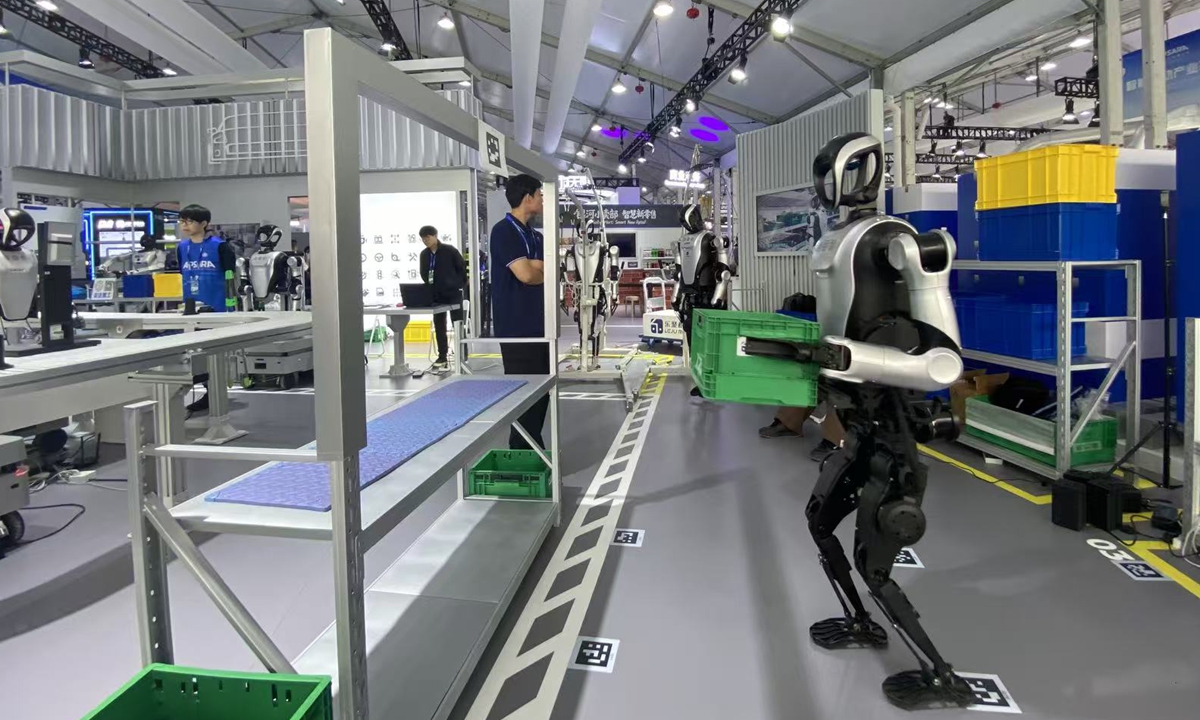The Apsara Conference 2025 kicked off on September 24,2025 in Hangzhou, East China’s Zhejiang Province. Photo: Zhang Weilan/GT
The Apsara Conference 2025 kicked off on Wednesday in Hangzhou, East China’s Zhejiang Province. Themed “AI on Cloud: The Rise of Human-Machine Synergy,” the three-day event focuses on cutting-edge technologies such as artificial general intelligence (AGI) and embodied intelligence. Industry observers expect it to boost demand for AI terminals, expand global cooperation and increase investment as the global AI race heats up.
This year’s event brings together more than 2,000 speakers from about 50 countries to explore the latest advancements in AI and cloud computing. The expo features more than 200 agent applications and 300 AI terminal products, including next-generation hardware such as AI glasses, AI personal computers and humanoid robots.
During the opening ceremony, Chinese tech giant Alibaba announced a significant upgrade to Alibaba Cloud’s full-stack AI system, achieving technological upgrades from large language AI models to AI infrastructure. This move aims to position the company as a full-stack AI service provider.
During his opening remarks, CEO of Alibaba Group Eddie Wu Yongming said that Alibaba plans to increase its capital expenditure on AI infrastructure from the original 380 billion yuan ($53 billion) over the next three years. By 2032, the company’s global data center energy consumption is expected to be 10 times higher than that in 2022, according to Wu.
The conference also features the debut of Alibaba Cloud’s high-density AI server, capable of supporting 144 computing nodes, the introduction of the next-generation high-performance network architecture HPN 8.0, as well as the upgraded versions of Tongyi Qwen large-language models.
Alibaba’s latest achievements are part of China’s broader push to lead the next wave of global AI innovation.
This year’s exhibition area is divided into three themed zones: the AI+ pavilion, the computing pavilion, and the frontier applications pavilion. The AI+ pavilion showcases large language AI models and intelligent agent tools, while the computing pavilion focuses on full-stack capabilities from chips to platforms. The frontier applications pavilion gathers more than 100 Chinese and international tech start-ups, according to the organizers.
Companies such as Siemens, SF Technology, China Eastern Airlines and MiniMax are showcasing their agent applications in scenarios such as power inspection and industrial sorting. Domestic automakers such as FAW, BYD, Li Auto and Xpeng have brought their smart cockpit and autonomous-driving outcomes, said the organizers.
A smart factory is in the spotlight at the frontier applications pavilion. At the booth of Shenzhen-based Leju Robotics, warehouse robots perform quality control tasks and move boxes. In automotive assembly lines, the robots are deployed to autonomously reposition empty boxes, collaborate on sorting tasks and inspect the quality of components.
A representative of Leju Robotics Hu Jie told the Global Times on Wednesday that the company’s Kuavo humanoid robots have been deployed in batches at the FAW Hongqi factory, performing intelligent tasks across multiple scenarios, including quality inspection, assembly, logistics and maintenance.
“We believe that in future smart factories, robots will be able to replace and perform all tasks that require human labor, and even do the job better,” Hu said.
MiniMax is showcasing its proprietary multimodal models and several native AI products, including MiniMax Agent and advanced AI video generator Hailuo AI, offering visitors an immersive intelligent service and audio-visual experience, the company told the Global Times on Wednesday.
The Shanghai-based AI unicorn has turned its booth into a living lab by performing on-site demonstrations powered by its proprietary foundation models -MiniMax M1, Hailuo 02, Speech 2.5 and Music 1.5, which can process ultra-long contexts and fuse text, audio, visuals and melodies in real time. These models and AI-native applications have provided services to more than 157 million individual users from more than 200 countries and regions, as well as more than 50,000 corporate customers and developers, according to the company.
The conference also highlights the importance of international collaboration in AI development. On Wednesday, Alibaba Cloud announced a partnership with Nvidia to integrate its PAI platform with Nvidia’s Physical AI stack, a move that aims to advance data synthesis, robot training and simulation for real-world AI apps. This collaboration is set to streamline the development of embodied intelligence and assistive driving technologies, according to Alibaba.
On Wednesday, the Hong Kong-listed shares of Alibaba jumped by more than 6 percent, hitting a new high since October 2021, the Securities Times reported.
The conference puts China’s AI applications, open-ecosystem collaboration and global outlook on full display, Liu Gang, chief economist at the National Research Institute for New Generation Artificial Intelligence Development Strategies, told the Global Times on Wednesday.
It showcases technological achievements, promotes the implementation of a “cloud-intelligence integrated” architecture and accelerates the deep integration of AI and industry, Liu said.
The conference has invited global companies such as Cisco, Accenture and Nvidia to participate, the Global Times learned at the exhibition area.
Liu said that by welcoming dozens of overseas partners, the event has turned Hangzhou into a cross-border marketplace for ideas, best practices and joint research and development, promoting technical exchange and localized practices and fostering international AI collaboration.
